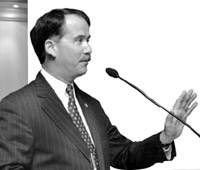U.S. Ambassador John Evans and director of the USAID Robin Philips were invited to a press conference on October 27th. The press conference was held in order to discuss the democracy projects implemented by the U.S. government.
We can not even mention the word “conference” because the ambassador could have simply spoken to the public by sending a message. Journalists did not need to be there. Mr. Evans, who was a little late to the conference, made his speech and answered a couple of questions. He ended the conference briefly and most of the journalists’ questions remained unanswered.
His speech was the following: there had been a packet formed last summer to aid the parliamentary elections in 2007 and the presidential elections in 2008. This means that Americans are already working in order to have free and fair elections in two-three years. After all, that will give Armenia “the golden opportunity to take the right course towards democracy, be ready for what is to come and overcome all obstacles.”
Everything is okay, but how come this is being done for the elections in 2007 and 2008? Didn’t we have the opportunity during the elections in 2003? Perhaps we didn’t have the golden opportunity. Americans have planned a project consisting of concrete steps to take. The project foresees clarifying the voters’ lists, improving organizational skills and spread of information. The U.S. Congress has approved the project and has even provided an amount of money (more than $6 million USD). This is overwhelming for some NGOs that only wait to receive grants. Some of that money will be provided to them so that they can widen the spectrum of informing the voters, stimulate the people and be involved in other “very important” jobs.
In response to one of the journalists’ questions as to the effectiveness of the projects if the authorities would not want it and there would be falsifications, John Evans replied that they have learned a lot from the past years and they will make sure that nothing like that happens again. He even made a reference to National Assembly president A. Baghdasaryan’s words when he said that falsifications are in the past. In some way, the Armenian feels happy that it has managed to “teach a lesson” to the know-it-all Americans. On the other hand, I am more than sure that through time, we will find other things to teach them. What’s interesting is that nothing was said about the referendum during the conference. As a matter of fact, John Evans stated beforehand that he was not going to talk about that, but rather, the “golden opportunity” of 2007-2008. In that case, we can come up with three conclusions: (a) Americans are sure that the referendum will be free and fair, (b) Americans are sure that there is little time to make sure that the referendum is free and fair, so they refrain from talking about that, and (c) the process does not interest Americans. The important thing is the result. If the amendments are not passed, then that will mean that the referendum was fair. If they pass, even better-we will have a better constitution. This last one is close to reality, especially if we take into consideration the fact that Mr. Evans was for the amendments, something for which he was criticized. He also replied to this question: “I have said what the U.S. government thinks. The government thinks that the amendments serve as progress. However, if you have noticed, I always say that elections are the people’s in the end of my speech,” said the ambassador.
There were other interesting comments made, in particular the one that “there is great progress in democracy in Armenia”. The most interesting comment was made by John Evans when he said that “the U.S. is not in favor of the revolutions on the streets. Revolution is a sign of failure. The U.S. prefers letting things happen as they should, which is when the authorities change through the means of election.” There is no need to make interpretations…Of course, the conference was commented on by different mass media. The authorities’ media were implied that the U.S. did not support the projects implemented by the opposition; that the oppositionists were disappointed and unsatisfied while the rest were just expressing what they heard without any comments. What was most interesting was to hear the “Republic” political party’s comment in regard to this since they are the ones who firmly believe that the referendum will turn into a revolution. We talked to member of the political party’s council Suren Surenyants who presented the orientation of the political party. “We appreciate all that the U.S. is doing for developing democracy in Armenia, however, we want to make it clear that the Armenian people decide when the right time is for that and the political struggle which will help legal authorities come to power. We consider the upcoming referendum as our chance to make everything legal,” said Mr. Surenyants.

